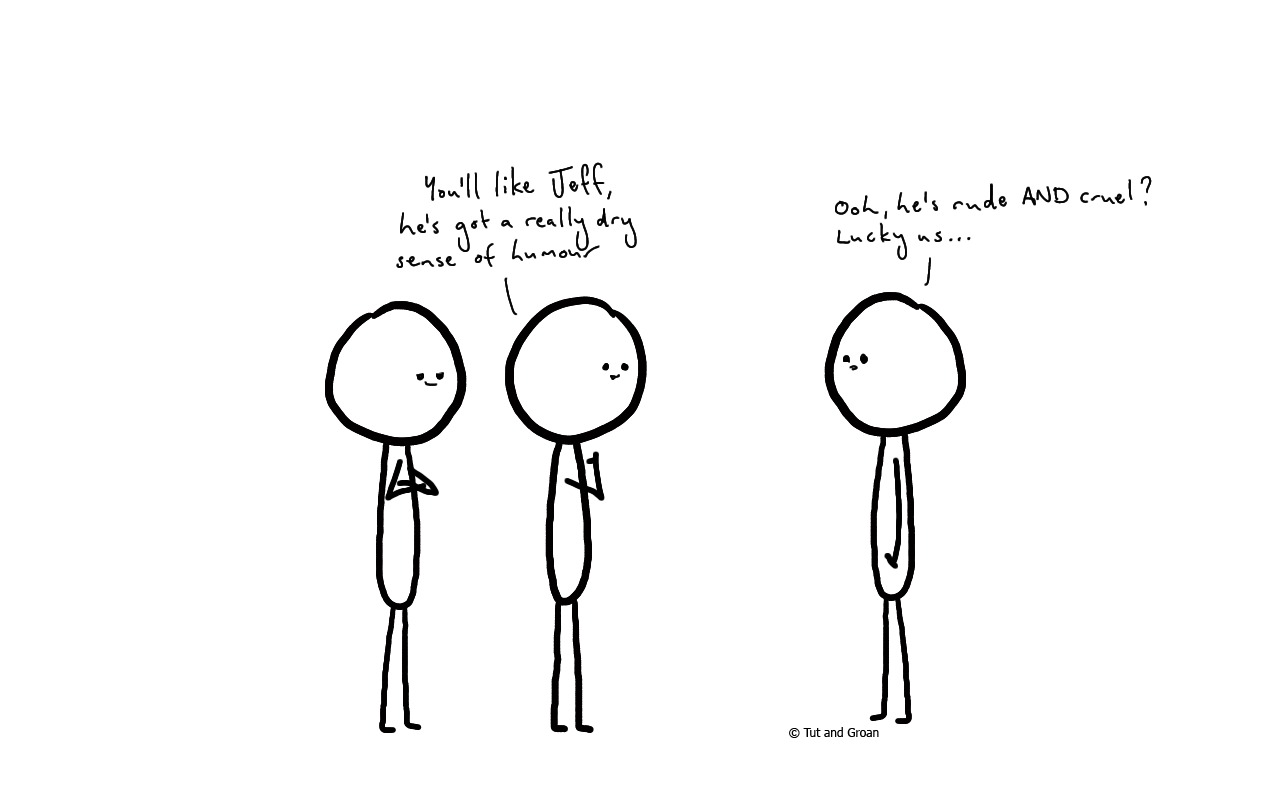Dry Sense Of Humour Meaning: Why Witty Jokes Are The Secret Weapon Of Cool Conversations
Apr 19 2025
Ever wonder why some people can crack jokes without even trying, yet still make everyone laugh? That's what we call a dry sense of humour, folks. It's that subtle, clever, and understated wit that sneaks up on you like a ninja. No big gestures, no loud laughter—just pure genius wrapped in calm delivery. If you're curious about what it means and how it works, you're in the right place. We're diving deep into the world of dry humour, where less is definitely more.
Now, before we get too far ahead of ourselves, let's break down what a dry sense of humour really means. Think of it as the James Bond of comedy—cool, collected, and always one step ahead. It's not about screaming "hilarious" at the top of your lungs; instead, it's about saying something so clever that it makes people scratch their heads, smile, and then burst into laughter. It's subtle, sharp, and oh-so-appealing.
But why does dry humour matter? In a world where memes and viral jokes dominate, having a dry sense of humour gives you an edge. It makes you stand out in conversations, adds a touch of sophistication to your personality, and, most importantly, keeps people coming back for more. So, buckle up because we're about to explore everything you need to know about this witty phenomenon.
Read also:Snowbird Browns Marriage Status The Ultimate Guide
What Exactly is a Dry Sense of Humour?
Dry humour, or dry wit, is all about saying something funny in a deadpan, matter-of-fact way. Imagine someone telling a joke with a straight face, as if they're just stating a fact. That's the essence of dry humour. It thrives on irony, sarcasm, and clever wordplay, but the delivery is what makes it truly special. The audience has to think for a second—or sometimes longer—before realizing they've just been served a joke. It's intellectual comedy at its finest.
For example, picture this: Someone accidentally drops their coffee cup, and instead of making a big deal out of it, you casually say, "Well, that was graceful." See how it works? It's not loud or exaggerated—it's calm, cool, and collected. And that's exactly why people love it.
Key Characteristics of Dry Humour
Let's break down the key traits that make dry humour so unique:
- Deadpan Delivery: The joke is delivered with a straight face, no smiles, no laughs. It's all about keeping it cool.
- Irony and Sarcasm: These are the bread and butter of dry humour. Saying the opposite of what you mean or pointing out the absurdity in a situation is a classic move.
- Subtlety: Dry humour doesn't hit you over the head with a mallet. It's subtle, clever, and often requires a second thought.
- Intellectual Wit: It's not just about being funny; it's about being smart. Dry humour often involves wordplay, puns, and clever observations.
Why Dry Humour is So Appealing
There's something magnetic about people who can deliver dry humour. They exude confidence, intelligence, and a certain je ne sais quoi that makes them irresistible. But why is dry humour so appealing? It boils down to a few key reasons:
First, it shows intelligence. When someone can craft a witty remark on the spot, it demonstrates quick thinking and a sharp mind. Second, it's sophisticated. Unlike slapstick comedy or over-the-top jokes, dry humour is refined and understated. Lastly, it's unexpected. People love being surprised, and dry humour has a way of sneaking up on you and delivering a punchline when you least expect it.
How Dry Humour Builds Connections
One of the coolest things about dry humour is how it helps build connections. When someone gets your joke, it creates a shared moment of understanding. It's like a secret handshake between you and the person who "gets it." This shared experience can strengthen relationships, whether it's with friends, colleagues, or even strangers.
Read also:Is Vanessa Ferlito Gay Unpacking The Truth Behind The Rumors
Think about it: If you're at a networking event and you manage to crack a witty, dry joke, you're instantly memorable. People will remember you as the clever one who made them smile, and that can open doors in both personal and professional settings.
Examples of Dry Humour in Action
To really understand dry humour, let's look at some examples. Here's a classic one from the legendary Mr. Bean:
"I'm not saying I hate children, but I was driving to a children's party once, and I was relieved when I crashed into a school bus."
See how it works? It's not loud or obvious—it's clever and subtle. Another great example comes from the world of movies. In "The Grand Budapest Hotel," there's a scene where the main character says:
"We're not barbarians. We just kill people."
Boom. Dry humour at its finest.
Real-Life Situations Where Dry Humour Shines
So, where can you use dry humour in real life? The possibilities are endless! Here are a few scenarios:
- At Work: During a meeting, someone suggests a ridiculous idea. You can respond with, "That's the most original idea I've heard all week. Let's not ruin it with reality."
- With Friends: When your friend shows up late, you can say, "Oh good, I thought I was the only one who didn't get the memo about this being optional."
- On Dates: If the conversation lags, try something like, "This silence is awkward, but at least it's not as awkward as my last haircut."
The Psychology Behind Dry Humour
Why do some people naturally have a dry sense of humour while others struggle? It all comes down to psychology. People with a dry sense of humour tend to be highly observant and introspective. They notice the absurdities in everyday life and find humor in them. They're also often introverts who prefer to listen and observe rather than dominate conversations.
Studies have shown that people with a dry sense of humour tend to be more intelligent and creative. They're able to think outside the box and come up with clever remarks that others might not see. Plus, they're usually great listeners, which helps them tailor their jokes to the situation and the audience.
How to Develop a Dry Sense of Humour
If you're not naturally blessed with a dry sense of humour, don't worry—you can still develop it. Here are a few tips:
- Practice Observational Skills: Pay attention to the world around you. Look for the absurdities and ironies in everyday life.
- Read Widely: Expose yourself to different types of humour. Books, movies, and TV shows with dry humour can be great sources of inspiration.
- Be Patient: Dry humour is all about timing. Don't rush your jokes—let them simmer for a bit before delivering them.
- Embrace Sarcasm: Sarcasm is a key component of dry humour. Practice using it in a way that's clever, not mean-spirited.
Common Misconceptions About Dry Humour
There are a few misconceptions about dry humour that we need to clear up. First, some people think that dry humour is the same as sarcasm. While sarcasm is a big part of dry humour, they're not identical. Sarcasm can be harsh or mean-spirited, whereas dry humour is usually more lighthearted and clever.
Another misconception is that dry humour is only for introverts. While it's true that many introverts have a dry sense of humour, extroverts can be just as witty. It's all about delivery and timing.
Why Dry Humour Isn't for Everyone
Not everyone appreciates dry humour, and that's okay. Some people prefer more obvious forms of comedy, like slapstick or puns. Others might not "get" the subtlety of dry humour, especially if they're not used to it. The key is to know your audience and tailor your jokes accordingly.
Cultural Differences in Dry Humour
Dry humour can vary widely across cultures. In the UK, for example, dry humour is practically a national pastime. The British are masters of sarcasm and understatement, and their jokes often rely on cultural references that might not translate well to other countries.
In contrast, American humour tends to be more straightforward and exaggerated. While dry humour exists in American culture, it's often mixed with other forms of comedy, like slapstick or puns.
How to Adapt Dry Humour to Different Cultures
If you're traveling or working with people from different cultures, it's important to adapt your dry humour accordingly. Here are a few tips:
- Do Your Research: Learn about the cultural references and humour styles of the people you're interacting with.
- Start Small: Begin with simple, universal jokes before diving into more complex ones.
- Be Observant: Pay attention to how people react to your jokes. If they don't get it, adjust your approach.
The Impact of Dry Humour on Mental Health
Believe it or not, dry humour can have a positive impact on mental health. It helps people deal with stress, anxiety, and even grief. When life gets tough, a well-timed dry joke can provide much-needed relief. It's like a mental reset button that helps you see the lighter side of things.
Studies have shown that people who use humour as a coping mechanism tend to be more resilient and better at handling adversity. So, if you're feeling down, try cracking a dry joke. It might just be the pick-me-up you need.
When Dry Humour Might Not Be Appropriate
While dry humour is great, there are times when it might not be appropriate. For example, in situations involving grief or serious topics, it's best to err on the side of caution. Dry humour can come across as insensitive if not delivered with care.
The key is to read the room. If the atmosphere is tense or emotional, it might be better to skip the jokes and focus on empathy instead.
Conclusion: Embrace the Power of Dry Humour
So, there you have it—the lowdown on dry humour. Whether you're naturally gifted with it or just starting to develop it, dry humour is a powerful tool that can enhance your conversations, build connections, and even improve your mental health. Just remember to use it wisely and always be mindful of your audience.
Now, it's your turn! Share your favourite dry jokes in the comments below, or let us know how dry humour has helped you in your life. And don't forget to check out our other articles for more tips and tricks on mastering the art of conversation.
Table of Contents
- What Exactly is a Dry Sense of Humour?
- Why Dry Humour is So Appealing
- Examples of Dry Humour in Action
- The Psychology Behind Dry Humour
- Common Misconceptions About Dry Humour
- Cultural Differences in Dry Humour
- The Impact of Dry Humour on Mental Health
- Conclusion: Embrace the Power of Dry Humour
- Key Characteristics of Dry Humour
- How Dry Humour Builds Connections


